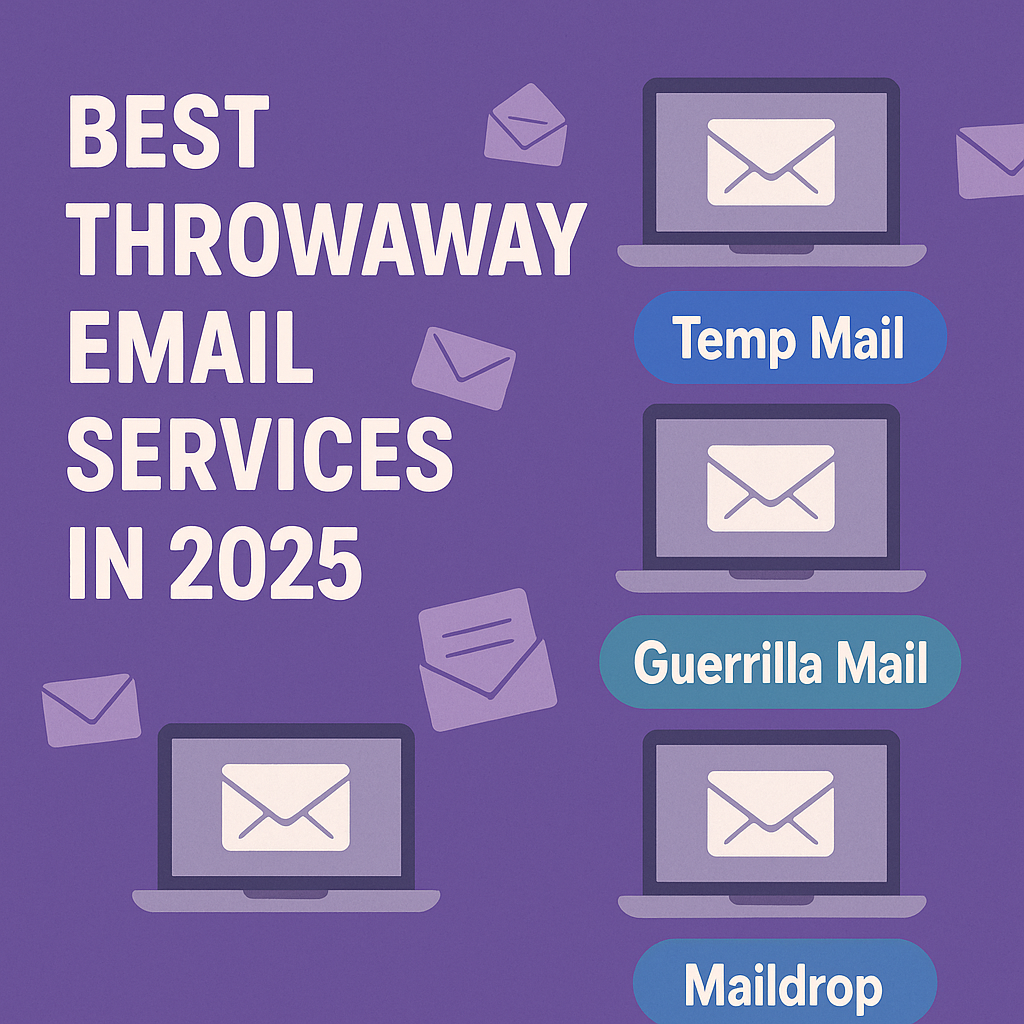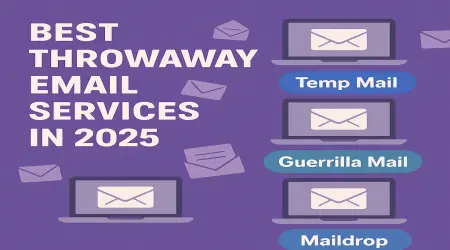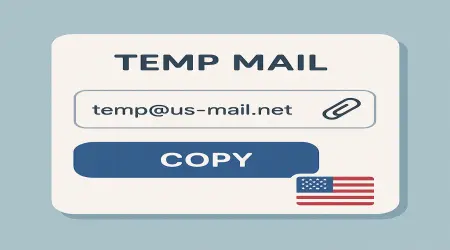

Best Throwaway Email Services in 2025
 Throwaway email services have become an essential tool for everyday users, developers, marketers, and privacy advocates alike. Whether you're signing up for a new service, testing an application, or simply trying to avoid spam, a temporary or disposable email address can save you from clutter and protect your personal identity. In 2025, throwaway email services have evolved significantly, offering smarter, faster, and more secure solutions than ever before. This guide explores the best throwaway email services in 2025, diving into features, usability, privacy policies, and what makes each one stand out.
Throwaway email services have become an essential tool for everyday users, developers, marketers, and privacy advocates alike. Whether you're signing up for a new service, testing an application, or simply trying to avoid spam, a temporary or disposable email address can save you from clutter and protect your personal identity. In 2025, throwaway email services have evolved significantly, offering smarter, faster, and more secure solutions than ever before. This guide explores the best throwaway email services in 2025, diving into features, usability, privacy policies, and what makes each one stand out.
Temp-Mail remains one of the most popular throwaway email services available. It allows users to generate a disposable email address instantly without requiring any registration. The interface is user-friendly, optimized for both mobile and desktop use, and messages arrive in real-time. One of the biggest advantages Temp-Mail offers is support for attachments and HTML content, making it suitable for modern web services that require rich email formatting or file delivery. In 2025, Temp-Mail has added new domains and improved its API integration, making it a favorite among developers looking for automation in testing environments. Its auto-deletion feature ensures that emails are removed after a predefined period, protecting user anonymity.
Guerrilla Mail has been a long-time favorite for those seeking more control over their temporary inboxes. Unlike many other throwaway services, Guerrilla Mail lets users select a custom email address and choose from a wide variety of domains. This flexibility is particularly useful for users who find certain domains blocked by websites. Guerrilla Mail also supports attachments and updates inboxes in real time. For those concerned about privacy, the service does not log IP addresses and offers a strong no-logs policy. In 2025, Guerrilla Mail continues to be a robust tool for privacy-focused individuals and QA testers who need a bit more customization.
10MinuteMail lives up to its name by providing users with a disposable email address that expires after ten minutes. However, users can extend the session if more time is needed. Its minimal interface and straightforward functionality make it ideal for quick tasks like account verification or downloading gated content. 10MinuteMail does not support attachments but remains extremely lightweight and fast. It is perfect for those who prioritize simplicity and speed over advanced features. In 2025, its mobile optimization and expanded language support make it a global favorite for temporary email solutions.
EmailOnDeck has carved out a niche by offering a balance between usability and privacy. It supports instant generation of disposable email addresses and includes options for upgrading to persistent inboxes through cryptocurrency payments like Bitcoin, ensuring anonymity. In addition to quick inbox setup, EmailOnDeck supports basic HTML formatting and provides fast email delivery. Developers appreciate its simple API access, while users looking for privacy enjoy the service’s strong data deletion practices. In 2025, EmailOnDeck has enhanced its spam filtering and improved UX for mobile devices.
Maildrop offers another simple yet effective solution for temporary email. It does not support attachments but provides solid spam filtering and fast inbox updates. Maildrop allows users to choose a username, generating a public inbox that anyone can access if they know the address. This transparency can be a double-edged sword—it's excellent for testing shared inbox scenarios but unsuitable for sensitive information. Still, the service's ease of use and lack of registration make it a popular choice for lightweight tasks. In 2025, Maildrop has refined its interface and increased inbox storage temporarily to accommodate higher volumes.
Burner Mail provides a slightly different take by integrating directly with your browser. Available as extensions for Chrome and Firefox, Burner Mail lets users generate new email aliases with a click. Emails sent to these aliases are forwarded to your real inbox, keeping your actual email address hidden. Users can disable or delete aliases at any time. This makes it perfect for long-term use cases like newsletters, promotions, or ecommerce accounts where users might want some level of continuity without compromising privacy. In 2025, Burner Mail has introduced AI-based spam filtering and smart suggestions for alias naming.
SimpleLogin is a privacy-focused aliasing tool rather than a classic throwaway email provider, but it deserves mention for its powerful capabilities. It allows users to create email aliases that forward to their real inbox, preserving privacy and allowing full control. SimpleLogin is open-source, supports custom domains, and includes browser extensions and mobile apps. In 2025, it has integrated advanced encryption and partnership support with ProtonMail, making it one of the most secure solutions for email aliasing and privacy management.
AnonAddy is another alias-based service designed for privacy enthusiasts. Like SimpleLogin, it offers alias generation, encrypted forwarding, and custom domain usage. It's particularly popular among developers and open-source users thanks to its API and GitHub integration. AnonAddy offers both free and premium tiers, with additional control features such as reply forwarding, bandwidth limits, and alias disabling. In 2025, AnonAddy expanded its infrastructure to improve speed and uptime, making it a reliable option for privacy-first users.
Mailinator is geared more toward developers and QA teams. It provides public inboxes that anyone can view, which is excellent for testing workflows and team collaboration. Paid plans unlock private inboxes, domain control, and attachment support. Mailinator’s APIs and webhook integrations are top-tier, and its dashboards are built for scale and performance. In 2025, Mailinator continues to serve as a robust enterprise-grade testing environment with added tools for test automation and CI/CD pipelines.
ThrowAwayMail stays true to the spirit of simple, no-fuss throwaway email. You land on the page, get an email address, and your inbox is live. Emails last for 48 hours, and no sign-up is required. It doesn’t support attachments or custom domains, but its straightforward nature makes it great for fast, one-time verifications. In 2025, ThrowAwayMail has enhanced its privacy policies and optimized performance across browsers and devices.
The demand for disposable email addresses is only growing as people become more aware of the privacy risks involved with sharing personal information online. Websites track user behavior, sell email lists, and often bombard users with unwanted messages. Throwaway emails provide a protective barrier between your real identity and the internet's clutter. They are essential tools not just for convenience, but for preserving your digital rights.
Choosing the best throwaway email service depends entirely on your use case. If you need instant access without sign-up, Temp-Mail and 10MinuteMail are top contenders. If you're a developer testing emails at scale, Mailinator and Guerrilla Mail offer robust solutions. For long-term privacy and aliasing, Burner Mail, AnonAddy, and SimpleLogin stand out.
These services have made significant strides in 2025 to adapt to changing technologies and user expectations. With enhancements like AI-based spam filtering, dark mode support, mobile optimization, and encrypted forwarding, they are now more sophisticated than ever. What once started as a workaround to avoid spam has now evolved into a suite of essential tools for privacy and productivity in the digital world.
Whether you're signing up for a free trial, managing hundreds of test accounts, or simply trying to reduce your exposure online, there's a throwaway email service designed to meet your needs. As internet users become more privacy-conscious and savvy, these tools will continue to evolve, offering smarter and more secure ways to engage with the web without giving up control of your inbox.




